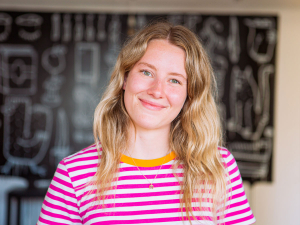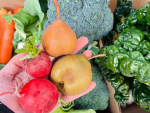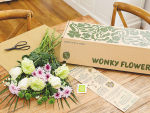Jackson and Angus Simms co-founded Wonky Box in 2022 in response to the significant amount of food waste faced by local growers as a result of supermarkets’ cosmetic standards for produce.
“Coming from London, where I was exposed to various sustainable shopping options for fresh produce, I noticed a gap for a ‘Wonky’ fruit & veggie box,” Jackson says.
“While travelling in Aotearoa, hearing first-hand from growers about their challenges with unpredictable weather, stringent retail standards for fresh produce, and rising costs, we decided to seize the opportunity and set up Wonky Box,” she explains.
The transition from her previous career in psychiatric nursing into fresh produce was something of a “significant leap”, she says.
However, Jackson says she’s proud of the impact the company has made since it was founded.
“Since starting Wonky Box in 2022, we’ve saved about 2 million kgs of produce from being wasted,” she says. “These are odd-looking and surplus fruits and veggies that would otherwise be discarded, despite the hard work and resources spent by growers. So, I’m thrilled that we’ve created a solution for growers in the industry.”
Jackson says that in the short time she has been a part of the industry, there has been a shift towards accepting imperfect produce in homes and businesses that are seeking more sustainable staff perks.
“Sustainable shopping has become a necessity, with consumers seeking transparency and preferring to support local – it’s a positive change, indeed!”
However, there’s still some room for improvement.
“Our industry is pretty male-dominated across the supply chain – from the growers to the distributors and logistics team. It would be great to encourage more female farm owners and address the gender gap in the produce distribution industry.”
She says that for those women seeking to enter the industry, they should remember that success doesn’t require them to mirror masculine traits.
“Embrace qualities like vulnerability, collaboration, and compassion – these are incredibly valuable strengths,” Jackson says.
“And rather than striving to fit into ‘boys’ clubs, invest your energy in circles that value inclusivity. Your authenticity is your greatest asset,” she concludes.



















